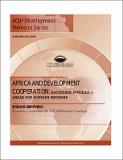| dc.contributor.author | Herfkens, Eveline | |
| dc.date.accessioned | 2013-09-27T08:38:24Z | |
| dc.date.available | 2013-09-27T08:38:24Z | |
| dc.date.issued | 2008 | |
| dc.identifier.citation | Herfkens, Eveline (2008) Africa and development cooperation : successes, pitfalls & areas for further reforms. ACBF development memoirs, no.1. Harare: ACBF. | en_GB |
| dc.identifier.uri | https://opendocs.ids.ac.uk/opendocs/handle/20.500.12413/2986 | |
| dc.description.abstract | Development assistance has been of benefit to developing countries over the years. It has helped tobuild physical infrastructural, human and institutional capacities and deliver some level of growth in recipient countries. Through civil society organizations, it has been instrumental in raising voices on the need for good governance, to stem the tide of corruption and promote development effectiveness of both aid and domestic resources.
Development assistance has equally had its negative results list. Traditional technical assistance has tended to supplant local capacity, undermine local knowledge and institutions and render recipient countries more vulnerable and dependent on aid. Reasons for these shortcomings are legion. Donor-driven projects are not derived from aid recipients' development priorities and are an expression of an attitude by donors that "they know better', "they lecture and recipients listen", "they give and poor countries receive", "they know and recipient countries learn", "they take care of things, because poor countries cannot"... Hence, as it was once said, when a professional from a donor country moves into a recipient country he/she is seen as an expert, but when a professional from a recipient country moves into a donor country, he/she is seen as an immigrant.
These and numerous other factors explain why aid has not succeeded in delivering development results in recipient countries. Trade is very important for poor countries. Yet, aid, because of donors' vested interest and recipients' development weaknesses remains a hugely attractive industry delivering billions of dollars annually to sub-Saharan Africa without tangible results. In spite of this, Africans are not speaking out loud and strong enough on the need for reforms to make aid deliver results. They are also not raising their voices effectively enough to deal with distortions in trade. For instance, disbursement of resources on commitments made by the G8 at its Summit in Glenn Eagles, Scotland in July 2005 is virtually zero and the European Union Economic Partnership Agreements are questionable. | en_GB |
| dc.language.iso | en | en_GB |
| dc.publisher | African Capacity Building Foundation | en_GB |
| dc.relation.ispartofseries | ACBF development memoirs;1 | |
| dc.rights.uri | http://creativecommons.org/licenses/by-nc-nd/3.0/ | en_GB |
| dc.subject | Development Policy | en_GB |
| dc.subject | Governance | en_GB |
| dc.subject | Millennium Development Goals | en_GB |
| dc.title | Africa and development cooperation : successes, pitfalls & areas for further reforms | en_GB |
| dc.type | Series paper (non-IDS) | en_GB |
| dc.rights.holder | African Capacity Building Foundation | en_GB |
| dc.identifier.externaluri | http://elibrary.acbfpact.org/ | en_GB |


